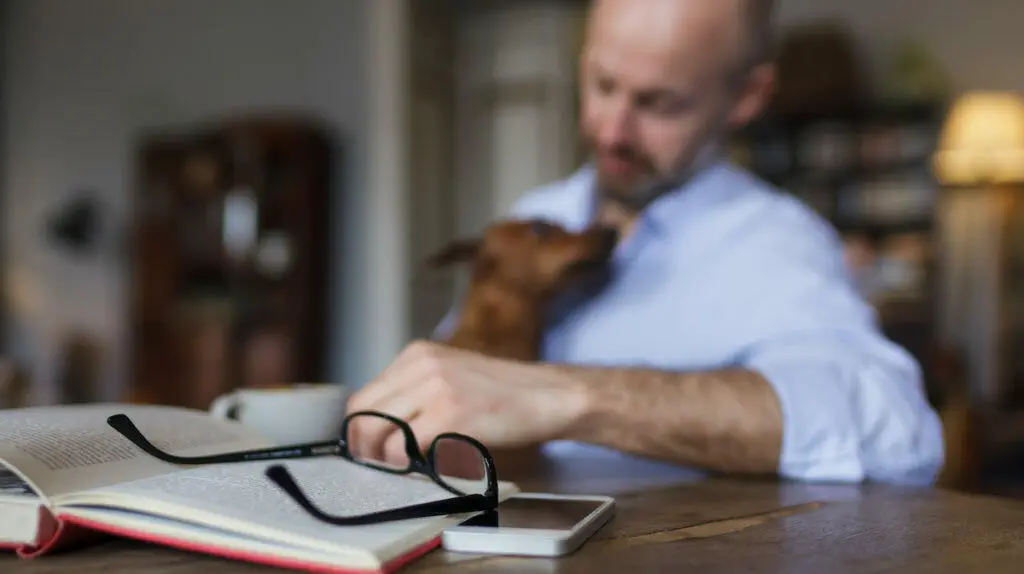Separation anxiety can be a completely natural behaviour and feeling for many dogs. They are pack animals, and you are their leader. Why would you possibly spend hours anywhere other than home?!
However, the COVID-19 pandemic didn’t help many pups.
Spending all day with their owners in lockdown, to then suddenly being left alone again while you leave for a day out or to go to work, is thought to have caused a spike in anxiety and stress in dogs.
You may also feel a bit nervous as to what they could get up to, which is why a pet camera may come in handy.
Even if they were previously used to being on their own for most of the day, all of the change of routine was probably the first upset, especially if you were working from home.
There is even the possibility that you were one of the wonderful people who adopted a dog during the Coronavirus outbreak – and know a dog is not just for Lockdown, but forever. Therefore, leaving them on their own will be new for both parties.
Separation anxiety in dogs
This is where dogs feel anxious, stressed or upset when they are left alone, or even when a certain ‘master’ leaves the home.
It can cause an elevated heart rate, respiratory struggles or excess barking and whining (which could be an issue for neighbours). Dogs may even take to going to the toilet inside, or damaging furniture by chewing and scratching.
It’s worth noting that not all dogs will initially show signs of this. In fact, if they have seemed to really need their own space when you have been at home, getting some peace and quiet may be good for them.
However, the realisation that they won’t just be left for an hour or so, and the fact that being left isn’t on their terms, could cause these issues to manifest even weeks after the initial changes.

How to get your dog used to being left alone
Heading back to the office and need to prepare? Below are some tips on how to help your dog accept the change when everything gets back to normal.
If you do think that they will not cope alone though, or that your new schedule may risk them getting less exercise, it could be worth looking into Doggy Daycare
Pretend to go to work
Know that you will be going back to the office on a certain date?
Prepare in advance – don’t just launch it at them on the day.
Go out of the house for a few minutes at a time, but treat it as though you are genuinely going back to work. Get your bag ready, pick up your keys, put your coat on and even do your lippy in the mirror before you go.
If you use a car, go and sit in it so they get used to the sound (maybe even just driving around the corner for ten minutes).
This way, they know you aren’t just going to put the bin bag in the bin or to feed the birds for a minute. They will remember these signs as a way to tell you are going somewhere, but can gradually get used to seeing it and settling into their own routine.
Start with 5 minutes, increasing to 10 and so on until you have reached an hour. This won’t take as long as you’d imagine.
When you eventually are doing it for real, they will be used to it again. Slowly increase the time you are gone, so they know you are coming back but also aren’t left alone for too long and you can detect initial signs of barking or stress.
Stagger your office days
If you are lucky enough to be in a job where you can have hybrid working, perhaps one or two days per week, then ask your boss about it.
Your dog will get used to you going to work for full days after the initial pretending above, but will also know that you are still living at home and haven’t completely left them!
Treat them correctly
Do they get overexcited when you come home? Don’t give in to this, as then they will realise that you coming home is something to get excited about.
As much as it is hard to ignore them, just put your things away as you would normally and then praise and give them attention when they are calm. This way, you going and coming home is just another part of their day.
Also, if they bark when you get home or when you were gone, don’t shout at them. This just encourages them to shout louder and can cause further anxiety if they know that when you come home, you will just be shouting. Don’t react to negativity.
Get them used to socialising again
They don’t just need to get used to being left on their own again, but may also need to get used to seeing more people when on walks and interacting with other dogs again if you were cautious about them getting too close previously.
Just because they were used to seeing Patch every day at the park doesn’t mean that everything will go back to normal, though.
After months apart, they may both be agitated so it is good to take things slowly and still be responsible. Don’t rush into anything.
Ensure it is done in a controlled space. Don’t allow people into your home en masse if it has been relatively empty for a few months, and always note changes in their behaviour.

